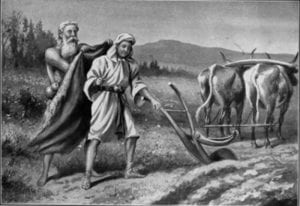
And Elias departing from thence, found Eliseus the son of Saphat, ploughing with twelve yoke of oxen: and he was one of them that were ploughing with twelve yoke of oxen: and when Elias came up to him, he cast his mantle upon him. And he forthwith left the oxen and ran after Elias, and said: Let me, I pray thee, kiss my father and my mother, and then I will follow thee. And he said to him: Go, and return back: for that which was my part, I have done to thee. And returning back from him, he took a yoke of oxen, and killed them, and boiled the flesh with the plough of the oxen, and gave to the people, and they ate: and rising up he went away, and followed Elias, and ministered to him. (1 Kings 19: 19-21 Douay-Rheims Bible)
Elijah put his cloak on Elisha to designate Elisha as his successor. After realizing this, Elisha asked Elijah to let him go home first and bid farewell to his mother and father, then he would follow Elijah. Elijah responded by telling Elisha to go home and that whatever his (Elijah’s) part in this calling, he had already done.
What part did Elijah have that he already did? He anointed Elisha with oil to become a prophet (1 Kings 19:16). Later, after Elijah was taken up to heaven in a whirlwind (2 Kings 2:11-12), Elisha took over Elijah’s ministry as prophet.
In the Gospel of Luke, as Jesus journeyed to Jerusalem with His disciples, He called out to a couple would-be followers and said, “Follow me!” But one said, “Lord, let me first go and bury my father.” (Luke 9:59) At the time of Jesus, someone who says “let me first bury my father” does not necessarily mean that his father has died. On the contrary, he is conveying his wish to remain with his father until his father dies. This expression is especially useful when one is pressed to commit to something that would significantly change a person’s life; “let me first bury my father” means “I cannot commit to you right now, but perhaps after my father has died.”
Jesus responded, “Leave the dead to bury their own dead; but as for you, go and proclaim the kingdom of God.” (Luke 9:60) It sounds absurd that Jesus would suggest that dead people can bury the dead, so Jesus must have meant something else. Those who do not listen to the Gospel, who do not follow Christ are dead in the Spirit. Let them bury the dead, but as for you whom I have called to follow me, go and proclaim the kingdom of God!
Another said to Jesus, “I will follow you, Lord; but let me first say farewell to those at my home.” Jesus said to him, “No one who puts his hand to the plow and looks back is fit for the kingdom of God.” (Luke 9:61-62) But what does this mean? In the Old Testament, Elijah permitted Elisha to go home and say goodbye to his father and mother, but is Jesus not allowing this person to do the same?
After Elisha returned home, he took the yoke of oxen and slaughtered them; then he used the plowing equipment for fuel to boil their flesh and gave it to the people to eat. Afterwards, he left and followed Elijah to serve him. (1 Kings 19:21) For Elisha to slaughter his oxen and to burn up his plowing equipment signifies that he is giving up his former way of life (his livelihood) to follow Elijah.
When Jesus said that no one who puts his hand on the plow and looks back is fit for the kingdom of God, it makes sense that whoever keeps looking back at his former sinful way of life after he has been called to a new life in Christ is not fit for the kingdom of God. “Looking back” in this context means to keep going back to former ways of sin despite the grace that God gives to him; in that case, it would be very difficult for him to attain the kingdom of God.